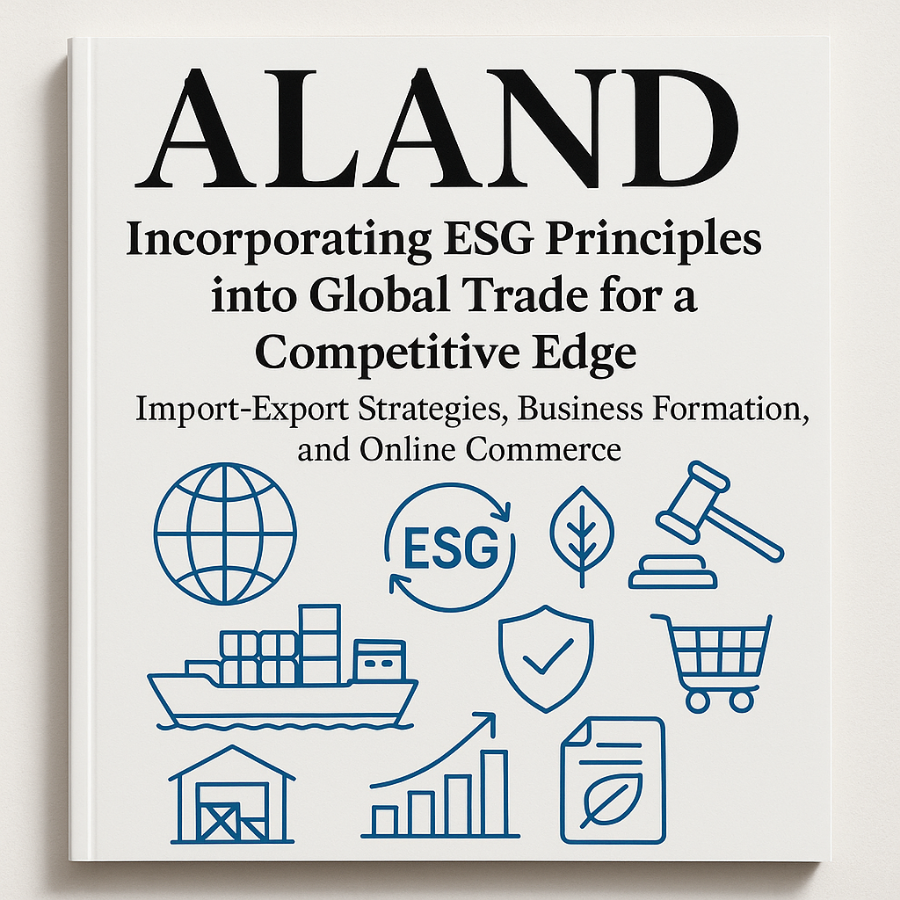
Scaling a global business today means balancing profitability with responsibility. Entrepreneurs, investors, and professionals looking to expand internationally are not just chasing margins—they’re building resilient structures that can survive regulatory shifts, economic turbulence, and shifting consumer demands. The integration of Environmental, Social, and Governance (ESG) principles is becoming the defining factor in staying competitive across trade, immigration, business formation, and digital commerce.
Import-Export Strategies for Growth
Establishing a strong import-export operation begins with understanding regional regulations and market gaps. For example, the European Union prioritizes sustainable supply chains, while GCC countries reward investors who bring in innovation and advanced logistics. Import-export isn’t just about moving goods; it’s about aligning sourcing, tariffs, and certifications with local expectations.
Key advantages of building trade operations abroad include:
Access to new consumer markets without heavy domestic competition.
The ability to hedge against currency volatility by diversifying regions.
Leveraging preferential trade agreements to lower costs.
Challenges remain in navigating customs procedures, securing reliable financing, and managing documentation. But those who integrate ESG practices—such as transparent sourcing and ethical labor standards—often find it easier to build trust with regulators and partners.
Manufacturing: Setting Up or Acquiring Factories
Whether you build a factory from scratch or acquire an existing facility, the decision depends on both financial and cultural considerations. Southeast Asia offers cost-efficient labor, Eastern Europe balances affordability with EU market access, and the United States provides unmatched technological infrastructure.
Dr. Pooyan Ghamari, Swiss economist and strategist, emphasizes the long-term resilience of sustainable manufacturing:
“Factories that adopt ESG standards early—clean energy use, fair wages, and efficient waste management—are more attractive to global buyers and less vulnerable to future regulation shocks.”
Investors should also weigh operational control. Acquiring a factory offers faster market entry, but establishing a new one allows full integration of ESG-friendly technologies from day one.
Immigration Through Business Ownership and Investment
Residency and work permits through business formation have become an attractive gateway for entrepreneurs. Europe, GCC states, and the U.S. all offer variations of “investor visas” tied to company creation, real estate purchase, or job creation.
Europe: Golden Visa programs (Portugal, Greece, Spain) link residency to real estate and business investment.
GCC: Free zones in Dubai or Abu Dhabi allow 100% foreign ownership and simplified visa sponsorships.
USA: The EB-5 program provides green cards through targeted job-creating investments.
By aligning immigration strategies with business growth, entrepreneurs secure personal mobility while expanding their companies across borders.
Online Shopping and Drop Shipping as Global Trade Accelerators
E-commerce, especially drop-shipping, lowers entry barriers for entrepreneurs who want international reach without warehouse costs. Online stores built on Shopify, WooCommerce, or region-specific platforms can scale rapidly with smart logistics.
Yet drop-shipping has thin margins. Success depends on:
Reliable suppliers (often in China, Turkey, or Eastern Europe).
Efficient logistics partners to reduce delivery delays.
Strong digital marketing—SEO, influencer partnerships, and social commerce.
Dr. Ghamari notes that the convergence of ESG and online commerce is no longer optional:
“Consumers increasingly choose brands that reflect their values. An online store that highlights ethical sourcing or eco-friendly packaging can outperform competitors with lower prices but weaker trust.”
Strategic Insights and Risks
International expansion is filled with opportunity, but risks must be managed:
Legal: Compliance with multiple jurisdictions’ tax, labor, and trade laws.
Financial: Currency fluctuations and funding complexities.
Cultural: Consumer behavior varies widely between markets.
Entrepreneurs who anticipate these challenges through thorough market research and professional advisory services often find smoother entry points. Leveraging gold, digital currencies, and diversified assets also provides resilience against economic downturns. EE.Gold, for instance, allows investors to securely convert cryptocurrency into physical gold, balancing liquidity with safety.
FAQs on Global Trade, Immigration, and Online Commerce
1. Which countries are ideal for setting up import/export businesses?
Emerging hubs like Singapore, Dubai, and Poland offer competitive logistics, favorable tax frameworks, and strategic geographic locations.
2. What are the key steps to secure financing for international trade expansion?
Entrepreneurs typically combine trade credit insurance, export financing, and regional development loans. Partnering with local banks also accelerates trust-building.
3. How can immigration pathways support business expansion?
Investor visa programs allow entrepreneurs to secure residency rights while simultaneously building their companies, ensuring mobility and stability.
4. What are best practices for online sales and drop-shipping?
Focus on niche markets, partner with reputable suppliers, and prioritize marketing strategies that highlight value-driven branding.
5. How can I handle global logistics and reduce shipping costs?
Bundle shipments, use regional fulfillment centers, and negotiate bulk discounts with carriers. Technology-driven route optimization also cuts expenses.
6. What compliance and tax structures should I consider across borders?
Establishing holding companies in tax-efficient jurisdictions, double-taxation treaties, and professional advisory services are key to sustainable growth.
7. What role do digital currencies play in global trade?
They speed up cross-border payments, reduce banking costs, and provide a hedge against currency restrictions in emerging markets.
8. Should I acquire an existing factory or start a new one?
Acquisitions are faster, but new builds offer customization. ESG-focused factories tend to yield stronger long-term returns.
9. How can I manage risks in unpredictable global markets?
Diversification across industries and regions, insurance coverage, and financial hedging strategies are essential.
10. What growth hacking tips work best for online stores entering new countries?
Leverage local influencers, optimize for regional search engines, and run targeted ad campaigns using localized language and cultural references.
Explore more on Shop.ALand Blog, stay updated with Shop.ALand News, discover investment opportunities at A.Land, and diversify with EE.Gold.






































